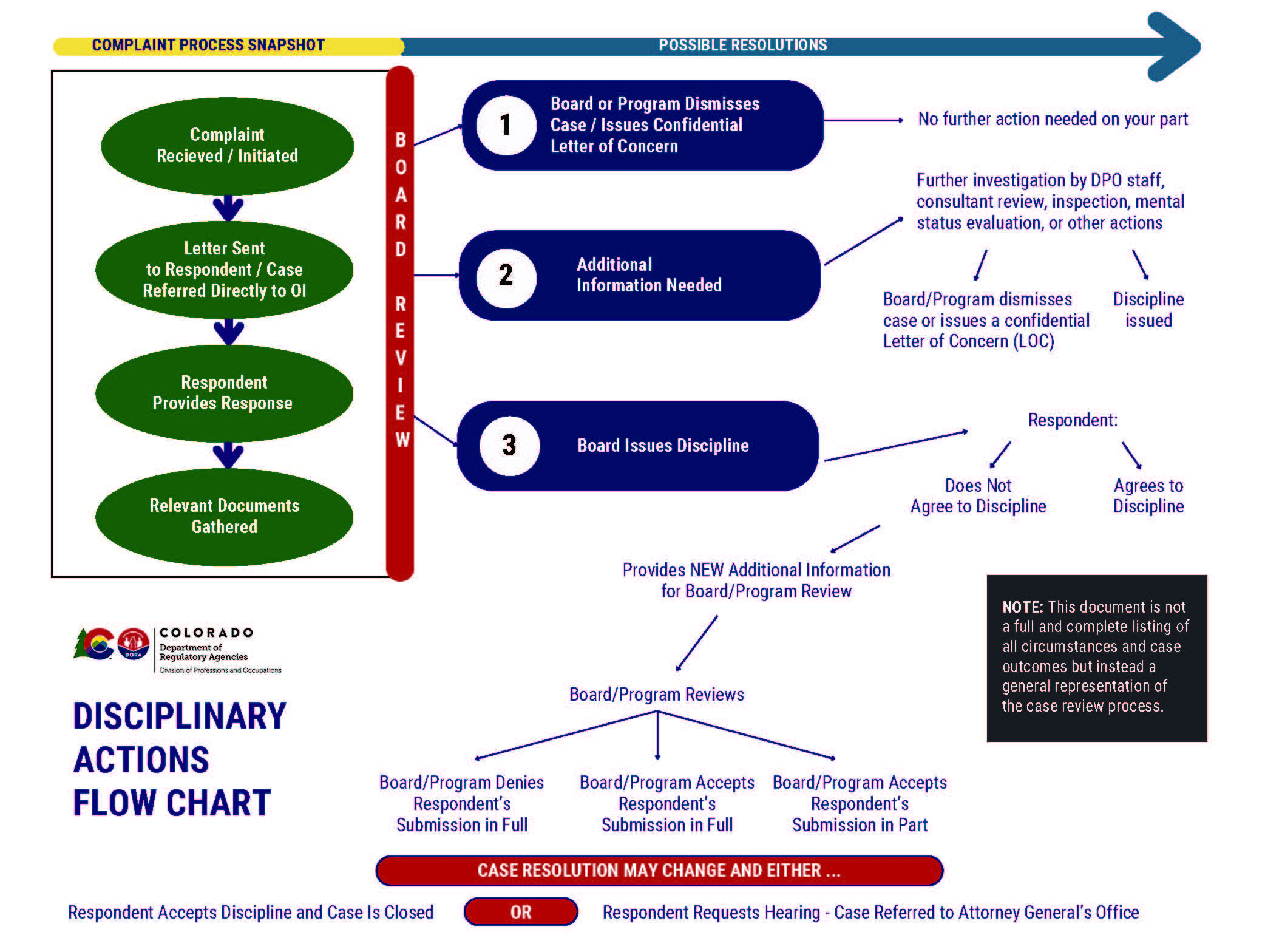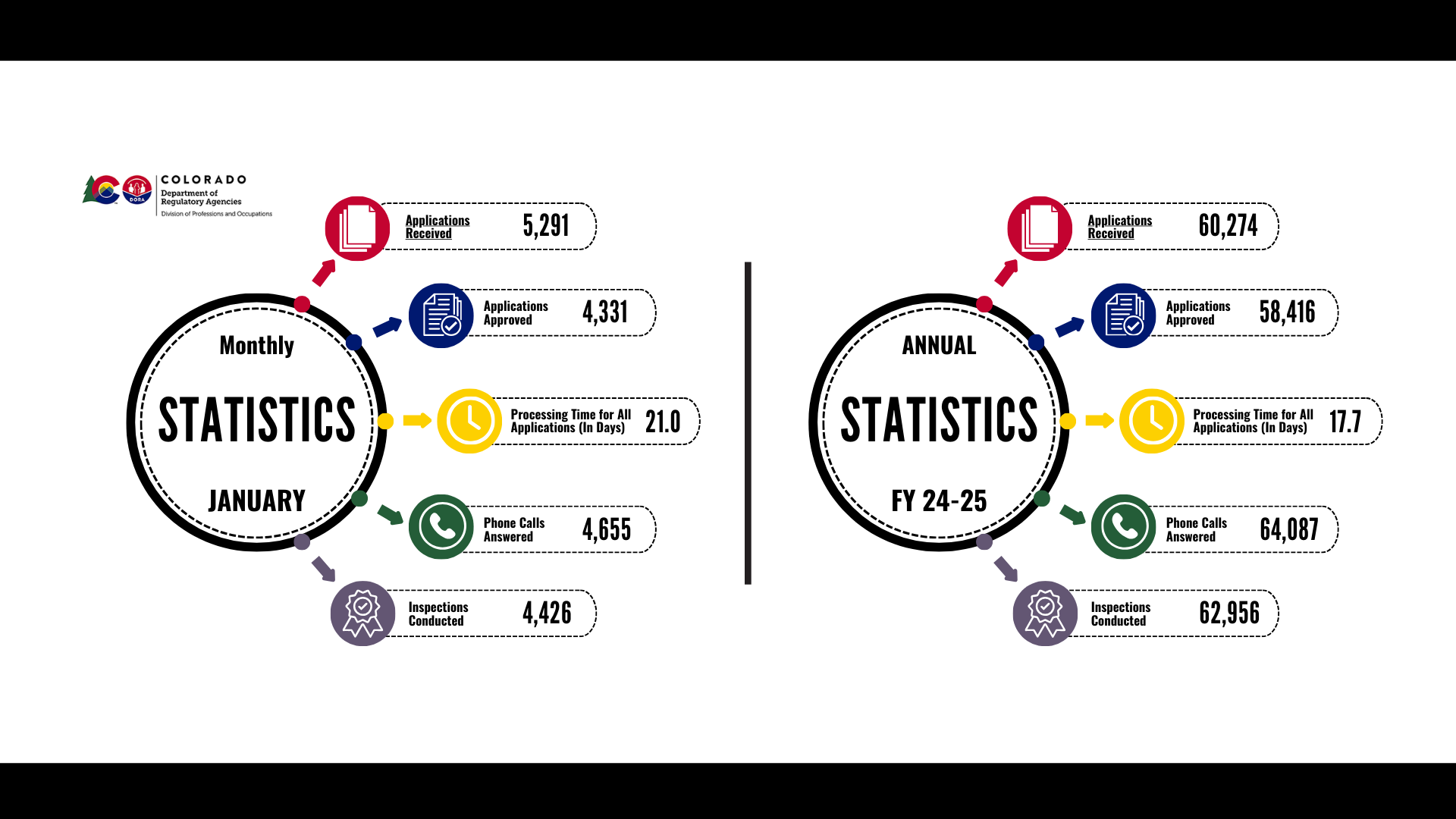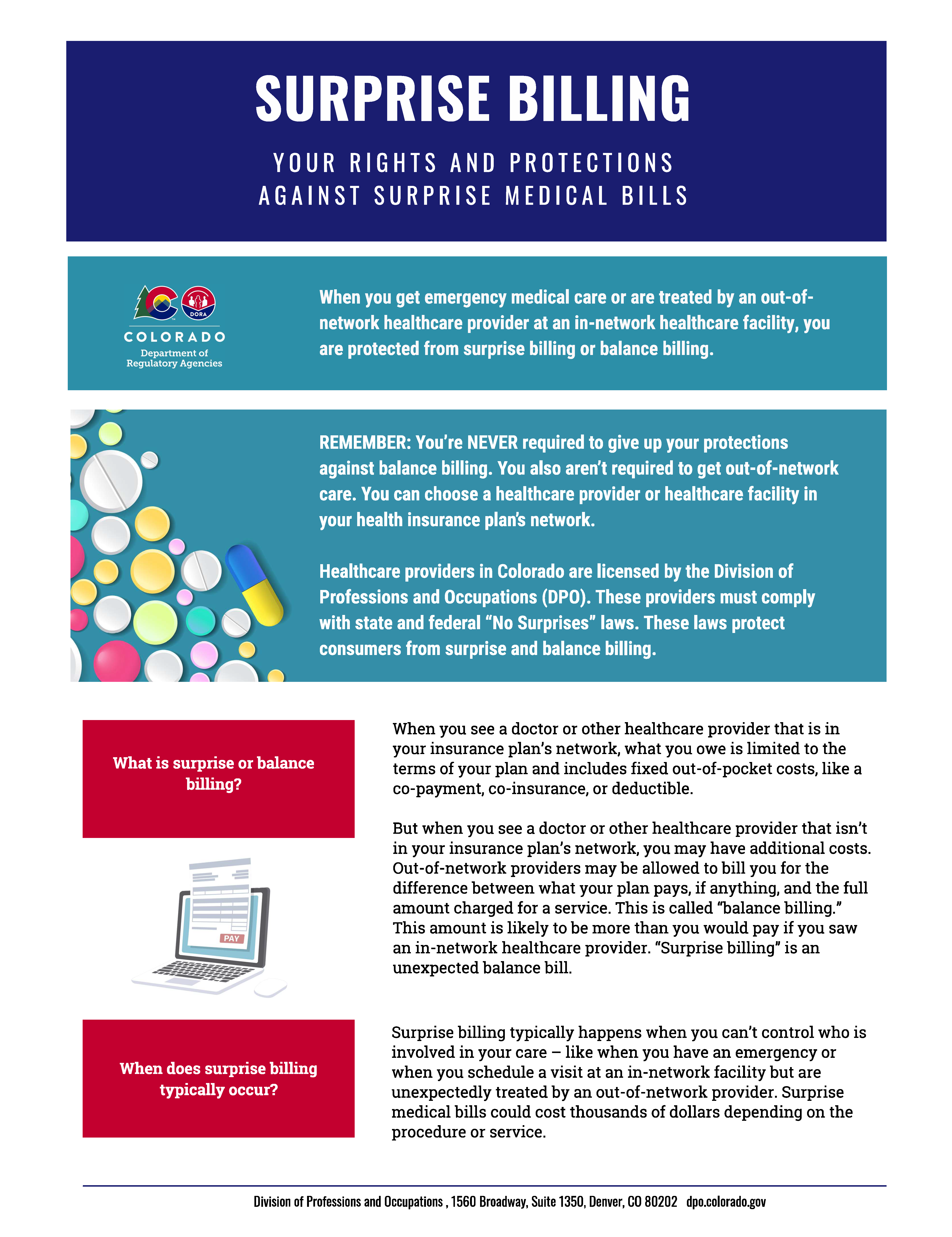Division of Professions and Occupations: General Information
Professional FAQ's
Information about Applications, Renewal, Reinstatement, Requirements, etc.
Q: Where do I get information about license applications, renewal, reinstatement, requirements, etc.?
A: You will find all applications, forms and licensing information under "Find Applications & Forms" on the appropriate Board or Program page for your profession. You may search for program homepages on our DPO Homepage.
Information about Complaints for Professionals
Q: What is the basis for disciplinary action?
A: Each profession has a practice act that contains laws that govern a particular profession. The legal grounds for disciplinary action against a particular type of professional are set forth in the applicable practice act.
Q: How does the disciplinary process begin?
A: The disciplinary process begins when a complaint is filed with the regulatory authority by any member of the public, or when a regulatory authority initiates a complaint on its own.
Q: What is a complaint?
A: In the context of professional disciplinary action, a complaint is an allegation that a licensee, certificate holder or registrant has violated the laws set forth in the applicable practice act. It is filed with or initiated by the appropriate regulatory authority, and it marks the beginning of the disciplinary process against a licensee, certificate holder or registrant.
Q: What happens after the complaint is filed?
A: The regulatory authority or its staff will review the facts alleged in the complaint to determine whether, if proven to be true, these facts constitute reasonable cause to believe a violation of the practice act has occurred. If the initial review determines that the regulatory authority does not have jurisdiction or that the regulatory authority does not have reasonable cause to believe that a violation has occurred, the complaint will be dismissed, possibly with a confidential letter of concern to the licensee, certificate holder or registrant from the regulatory authority.
If the regulatory authority determines that it has reasonable cause to believe a violation of the practice act has occurred, a letter of admonition may be issued, the matter may be referred for disciplinary action, the action may be tabled to gather information, or a request may be submitted for a formal investigation with the Office of Investigations.
Q: What is the Office of Investigations?
A: Some complaints are investigated internally by the staff for a particular regulatory authority. However, the regulatory authority may also refer the complaint to the Office of Investigations, a program within the Division of Professions and Occupations, Department of Regulatory Agencies.
Q: If the complaint is forwarded to the Office of Investigations, do I receive a notice?
A: You generally will receive a letter from the individual regulatory authority informing you that your complaint has been forwarded to the Office of Investigations. In some circumstances, however, the first contact you have regarding a complaint will be from the investigator assigned to handle the complaint.
Q: Do I need an attorney at this point?
A: A license, certificate or registration is an important property interest. It is important to remember that the regulatory authority, its staff, and the Office of Investigations cannot provide you with legal advice. You are not required to hire an attorney, but you have the right to be represented by an attorney at any stage of the proceeding. You are responsible for any costs associated with hiring an attorney. Your professional liability insurance carrier might provide assistance with legal costs associated with a professional disciplinary action.
Q: What happens in an investigation?
A: When a complaint is referred to the Office of Investigations, the assigned investigator acts as an impartial, fact-finding third party and does not "represent" the complainant, the regulatory authority, or the licensee, certificate holder or registrant. The Office of Investigations receives 500-600 cases a year. The average time to complete a case is 6 to 8 months depending on the complexity, witness cooperation and caseload of the investigator.
The investigator normally reviews the complaint and the response, subpoenas or otherwise obtains copies of pertinent documents or records, interviews witnesses and the licensee, certificate holder or registrant, and, where appropriate, retains an expert consultant to review the case. The investigator then prepares a written report that is reviewed by the regulatory authority, which will then determine whether to pursue disciplinary action. The investigator does not make any recommendations to the regulatory authority regarding what disciplinary action, if any, to take.
Q: How long does an investigation take?
A: The time frame to complete an investigation will vary. However, investigators try to process a complaint within 180 days of receipt of the complaint in the Office of Investigations. At times, the investigation of a case may take longer than 180 days. You may ask the investigator assigned to your case for an estimate of when the Report of Investigation will be prepared and presented to the regulatory authority.
Q: Do I get a copy of the Report of Investigation?
A: Generally, reports are not available to the public or to the licensee, certificate holder or registrant during the investigative stage of the proceeding or review process.
Q: Do I get notice of when the regulatory authority will review the Report of Investigation in my case?
A: This varies between programs. You may contact the regulatory authority or the investigator to inquire about the status of the investigation and the dates and locations of any meetings where the matter might be discussed. Some programs review Reports of Investigation in a closed meeting, which is not open to the public, including the licensee, certificate holder or registrant. Even if the disciplinary portion of the meeting is open to the public, generally you will not be permitted to address the regulatory authority and will only be allowed to listen to the discussion. Please check with the staff of your program.
Q: Can the public review government documents?
A: Regulatory authorities are governed by the Colorado Open Records Act, which provides public access to certain government documents. Confidentiality requirements vary from program to program, and the investigator assigned to your case cannot advise you on this topic.
Q: What happens after the regulatory authority reviews the Report of Investigation?
A: If the regulatory authority finds that no violation occurred or that disciplinary action otherwise is not warranted, the case will be dismissed. If the regulatory authority finds that disciplinary action is not warranted, but that it has concerns about the conduct at issue, it may dismiss the case with a confidential letter of concern. If the regulatory authority finds that a violation occurred, it may impose discipline, including but not limited to a public letter of admonition, a probationary license, a suspension or a revocation. Disciplinary cases will be referred to the Office of Expedited Settlement (ESP) for settlement or the Office of the Attorney General (OAG) for formal prosecution of the matter.
Q: What happens when your case is referred to ESP?
A: If your case is referred to ESP, you will be contacted by a staff member from ESP who will provide you with the offer of the settlement approved by the regulatory authority. Generally, if a settlement is not reached within 90 days, the matter will be referred to the Office of Attorney General (OAG).
Q: What happens if the case is referred to the OAG?
A: If your case is referred to the OAG, the assigned Assistant Attorney General will provide legal representation to the regulatory authority. The Assistant Attorney General may prepare formal charges based upon the alleged violations of the practice act. If formal charges are filed, a hearing will be conducted before an administrative law judge at the Office of Administrative Courts to determine whether the charges are proven. At the hearing, you would have the right to be represented by counsel and would have the opportunity to present and confront oral and documentary evidence, and to testify in your own defense.
Q: What happens if, after the hearing, I am found to have committed a violation?
A: Following the hearing, the administrative law judge will issue an initial decision, which will include factual findings, conclusions of law and a recommended sanction. Either party may challenge the initial decision by filing exceptions with the regulatory authority. The regulatory authority will review the initial decision and issue a final agency order that may adopt, partially adopt or reverse the initial decision. If a violation of the practice act is established, the final agency order may impose sanctions, which can include a letter of admonition, a fine, continuing education, probation, suspension or revocation of your license, certificate or registration. You have the right to appeal the final agency order to the appropriate court.

Consumer FAQ's
Information about Obtaining a List of Professionals and Entities
Q: How do I obtain a list of licensed professionals or entities in a particular area of the State?
A: You may access our entire Licensee Database Download through the Colorado Information Marketplace (CIM) DPO Data Set. The CIM holds all licensee data for all professions and occupations that DPO regulates and allows you to filter, review, research and even export in a format that best suits your needs.
Information about Disciplinary Actions
Q: Is it possible to get a copy of disciplinary actions filed against a licensed professional or entity?
A: Yes. You can access any public disciplinary action document through our Online Services. To look up a licensee, registrant or certificate holder and learn if there are any public disciplinary action documents available, visit our Online Services License Verification page.
Information about Complaints for Consumers
Q: How do I file a complaint against a professional regulated by the Division of Professions and Occupations?
A: If you are a consumer and you feel that a professional has violated the law or any Board/Program regulations, you may file a complaint against the licensee or individual with the appropriate Board or Program. View more information on how to file a complaint.
Q: Can the program help me resolve my billing dispute?
A: Boards and Programs cannot resolve billing or insurance issues. If you do have a billing or insurance issue, you may want to contact the Division of Insurance.
Q: Is it possible to get a copy of a complaint against a licensed professional or entity?
A: No. Complaints filed against licensed professionals or entities are confidential.
Online Service FAQ's
Information about logging in and accessing your account
Q: Why is the system informing me that there is no match found when I am trying to register my account?
A: There could be a few possible issues occurring with your account. Please attempt these troubleshooting options to resolve if you do have a license or an active application for licensure with the Division:
You may have a typographical error in your Name, Last 4 digits of your SSN/ITIN or your Date of Birth. Make sure to review your entry for accuracy. If the information is being typed correctly, there may be an error in our system regarding your information. Please contact us at dora_dpo_licensing@state.co.us to confirm your information. If you have recently applied for licensure via hard copy, please allow 10 days after mailing before your information can be accessed in our system.
Q: I am not currently licensed or I am applying for a license for the first time with the Division of Professions and Occupations. How do I create a new user account?
A: If you have never been licensed and are attempting to access our Online Services for the first time, you must Register a New Account. Once registered, you will be able to access all account options.
Information about researching licensees within our database
Q: How do I look up another individual or business?
A: You may search for a particular licensee within our database by using our Online License Verification.
Q: How do I download a list of Colorado Licensees?
A: You may access our entire Licensee Database Download through the Colorado Information Marketplace (CIM) DPO Data Set. The CIM holds all licensee data for all professions and occupations that DPO regulates and allows you to filter, review, research and even export in a format that best suits your needs.
Information about updating your contact information with the Division online
Q: How do I update my mailing address or phone number online?
A: Access Online Services and log into your account. To update your mailing address, the drop-down menu in the upper right-hand corner titled "Online Services" and then "Update Your Contact Information." Select on the "Start" button on the following page and follow the prompts to either select a previous address on file or create a new address record.
Q: How do I update my email address online?
A: Access Online Services and log into your account. To update your email address, the link in the upper right-hand corner titled "My Account." Your email address of record will display at the top of the page. Select the link next to it titled "Change Email." Enter your new email address. After you enter your email address and select "Update," the system will send a verification link to the email account provided. Access your email account and click the link provided before continuing into your account.
Information about options within Online Services like checking the status of a pending application or renewing your license
Q: How do I check the status of a pending application?
A: To check the status of a pending application, access Online Services and log into your account. Select the "My License/Application information" tab to view the status of any new, reinstatement, reactivation or renewal application. You will be able to review any incomplete items with instructions on submitting additional information by clicking on the "Review Application Progress" link next to your application listing.
Q: How do I renew my license online?
A: If your license is in a renewal period (within 6 weeks of the license expiration date) you will see a link titled "Complete License Renewal." Select the link and follow the instructions and prompts to renew your license. If you do not have this link available, then your license is not currently in renewal. If you feel this is in error, please contact us at dora_dpo_licensing@state.co.us or 303-894-7800.
Select an image below to Access the complete document.

